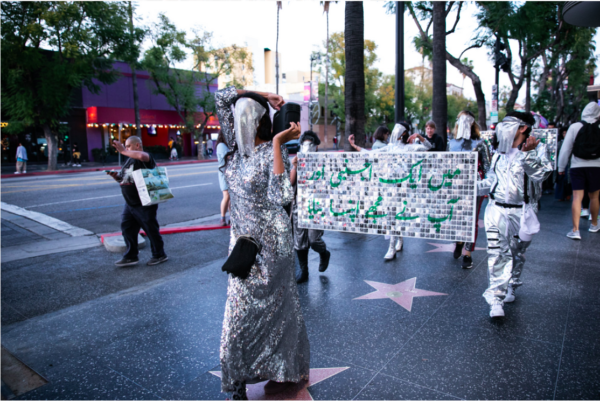radio kal #1: the root of freedom comes from ‘friya’ which means beloved

Image: Arshia Fatima Haq, Ajnabi Milan, 2019. Photo: Labkhand Olfatmanesh.
radio kal Episode #1: Arshia Fatima Haq and Fatimah Asghar
Arshia: The archetype of the enemy exists, the archetype of home, or the archetype of nationality or belonging and yet what structures actually house that are constantly shifting, are being demolished, are being reconstructed. It’s like a moving target. Still we so much rely on these archetypes to place us. I also very much identify with this idea of continual becoming. As South Asian femmes I feel that traditionally we have such specific maps that are given to us in terms of going from one identity to the other. When I read the first “Partition” that’s exactly what it is about – you’re this until you’re this, you’re this until you’re this. There is a sense of pursuit and a sense of fleeing, and a sense of migration. While in our present circumstance we might not experiencing that, – we’re pretty stable, we have these roofs over our head and this national identity now – that history is inscribed in us and constantly haunting and chasing us.
Fatimah: Our bodies are holding what our ancestors felt. If that was a pattern of flight, of, you know, we’re morphing in this pursuit of belonging. When that intersects with history, with a government, with a nation state that is really painful. I don’t believe in America and yet I do live in the government of America on stolen indigenous land. The way the West thinks about freedom as this individualistic pursuit. Actually, the root of freedom comes from ‘friya’ which is an indic root and it means beloved. The idea that freedom actually comes from being loved so strongly that you can do what you can do. It’s about kinship, about feeling belonging so that you can go and pursue the things you need to pursue. What do we belong to? What does being beloved mean to us? I don’t know these answers. So much of my work and my art is a pursuit of trying to understand where I come from so that I can understand my place in the world and where I belong.
– Conversation excerpts from radio kal Episode #1
radio kal is a fleeting space for artistic experimentation and for gathering community across space and time. radio kal’s opening episodes feature conversation, poems and sound works by poet, film maker, educator and performer Fatimah Asghar and artist Arshia Fatima Haq, co-founder of the decolonial club space and record label Discostan. The radio kal episodes #1 and #2 were recorded in Los Angeles in November 2020 and edited collectively across Colombo, Berlin, Karachi and Amsterdam during Shanti Suki Osman’s feminist radio workshop in December 2020.
Conversation: Recorded for a language where yesterday and tomorrow are the same word. Kal. in Los Angeles, November 2020.
Poems: Fatimah Asghar: Partition, Kal, When The Orders Came, in: Fatimah Asghar, If They Come For Us, One World, 2018.
Sound works: Arshia Haq, Line of Control: Forgotten Scores and Field Sounds from India and Pakistan, commissioned by Norient, 2014.
Arshia Haq & Nour Mobarak, The Second Coming of Fatima, 2019.
A collective and trans*oceanic edit by Aziz Sohail, Fiza Khatri, Imaad Majeed, Johanna Ekenhorst, Naja Sabahat Khan, Suza Husse, Venuri Perera, Vicky Shahjahan, Zahabia Khozema in Shanti Suki Osman’s feminist DIY radio workshop: radio kal / TOOLING#1 in December 2020.
Fatimah Asghar is a writer and filmmaker. In 2011 she created a spoken word poetry group in Bosnia and Herzegovina while on a Fulbright studying theater in post-genocidal countries. She is the writer and co-creator of Brown Girls, an Emmy-Nominated web series. A Ruth Lily and Dorothy Sargent Rosenberg Fellow, she was also featured on the 2017 Forbes’ 30 Under 30 list. She is the author of If They Come For Us (One World, 2018). She is the co-editor of Halal If You Hear Me, an anthology that celebrates Muslim writers who are also women, queer, gender nonconforming and/or trans.
Arshia Fatima Haq (born in Hyderabad, India, based in Los Angeles, CA) works across film, visual art, performance and sound. She is interested in counter-archives and speculative documentaries, and is currently exploring themes of embodiment and mysticism within the Islamic context. She is the founder of Discostan, a decolonial performance/club space and record label engaged with the SWANA (South and West Asia and North Africa) region and its diasporas. She also co-produces a monthly radio show for NTS.
radio kal is a stream of a language where yesterday and tomorrow are the same word. Kal. curated by Aziz Sohail and The Many Headed Hydra. kal is a project organized at District Berlin in collaboration with Archive Books and art spaces and queer*feminist initiatives in Colombo and Karachi. kal is supported by the Department for Culture and Europe in the Berlin Senate, the Goethe Institut Karachi and ifa.
